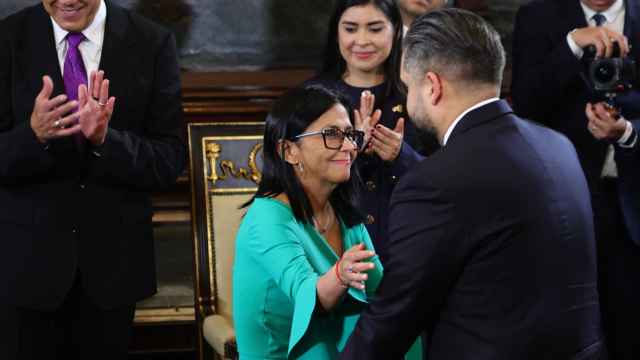KIEV— Ukraine wants to import up to 8 billion cubic meters of gas a year from central Europe to replace expensive Russian supplies and take advantage of lower prices on the European spot market, a senior energy official said.
Vadym Chuprun, deputy head of Ukrainian state energy firm Naftogaz, said Ukraine wanted to receive gas shipments through Poland, Hungary and Slovakia.
“I think the total volume [of supplies from Poland] will reach 1 billion cubic meters this year,” he told reporters late Tuesday at an energy conference in Kiev. “Separately, we plan to sign contracts on gas supplies in the amount of up to 7 bcm through Hungary and Slovakia.”
This year, however, total imports from Europe are likely to stand at a more modest level of 2 bcm, Chuprun told Reuters separately.
At the same time, Chuprun said, Ukraine planned to cut imports of Russian gas to 18 billion to 20 billion cubic meters this year from an estimated 24 billion to 25 billion in 2012.
All three countries — Poland, Hungary and Slovakia — receive natural gas from Russia shipped via Ukrainian pipelines, and Kiev wants to reverse some of those links to import gas from Europe.
Earlier this week, Ukrainian Energy Minister Eduard Stavytsky said Kiev could eventually completely replace Russian supplies with those from Europe.
Ukraine is paying about $430 per thousand cubic meters of gas imported from Russia.
In December, it bought the first small batch, 57 million cubic meters, of gas from Germany’s RWE at $408 per thousand cubic meters.
The disparity, which can become even larger if the European spot price declines, is due to the fact that Ukraine buys Russian gas under a 10-year contract signed in 2009 that links the price of gas to that of oil and oil products.
The government of President Viktor Yanukovych has sought since 2010 to renegotiate the contract signed by a previous cabinet but has so far failed to win any concessions from Moscow.
As a result, Kiev started exploring other options, such as importing gas from Turkmenistan, building a terminal to receive liquefied natural gas from the Persian Gulf and purchasing the fuel on the European spot market.
According to Simon Pirani, a researcher at the Oxford Institute for Energy Studies, the latter option is the most realistic.
The LNG project is too costly, Pirani said, and faces opposition from Turkey, which says it may not allow LNG tankers to pass through the congested Bosporus. And Turkmenistan would rather export its gas to nearby China.
“For Ukraine, overcoming obstacles to accessing gas from Europe may be far easier,” Pirani said at the energy conference in Kiev.
Related articles:
A Message from The Moscow Times:
Dear readers,
We are facing unprecedented challenges. Russia's Prosecutor General's Office has designated The Moscow Times as an "undesirable" organization, criminalizing our work and putting our staff at risk of prosecution. This follows our earlier unjust labeling as a "foreign agent."
These actions are direct attempts to silence independent journalism in Russia. The authorities claim our work "discredits the decisions of the Russian leadership." We see things differently: we strive to provide accurate, unbiased reporting on Russia.
We, the journalists of The Moscow Times, refuse to be silenced. But to continue our work, we need your help.
Your support, no matter how small, makes a world of difference. If you can, please support us monthly starting from just $2. It's quick to set up, and every contribution makes a significant impact.
By supporting The Moscow Times, you're defending open, independent journalism in the face of repression. Thank you for standing with us.
Remind me later.





